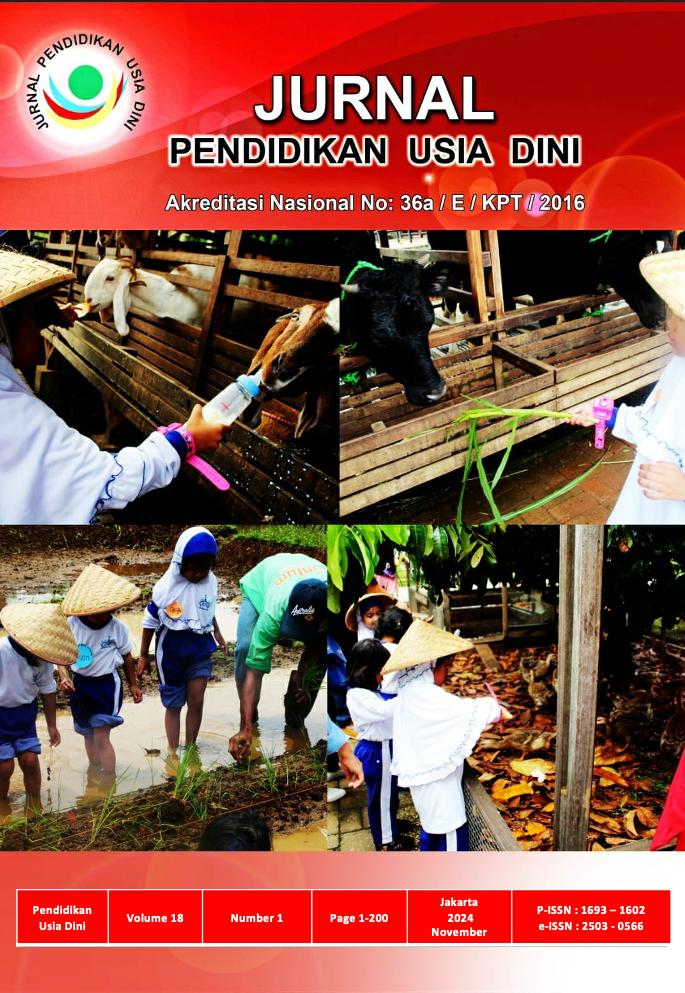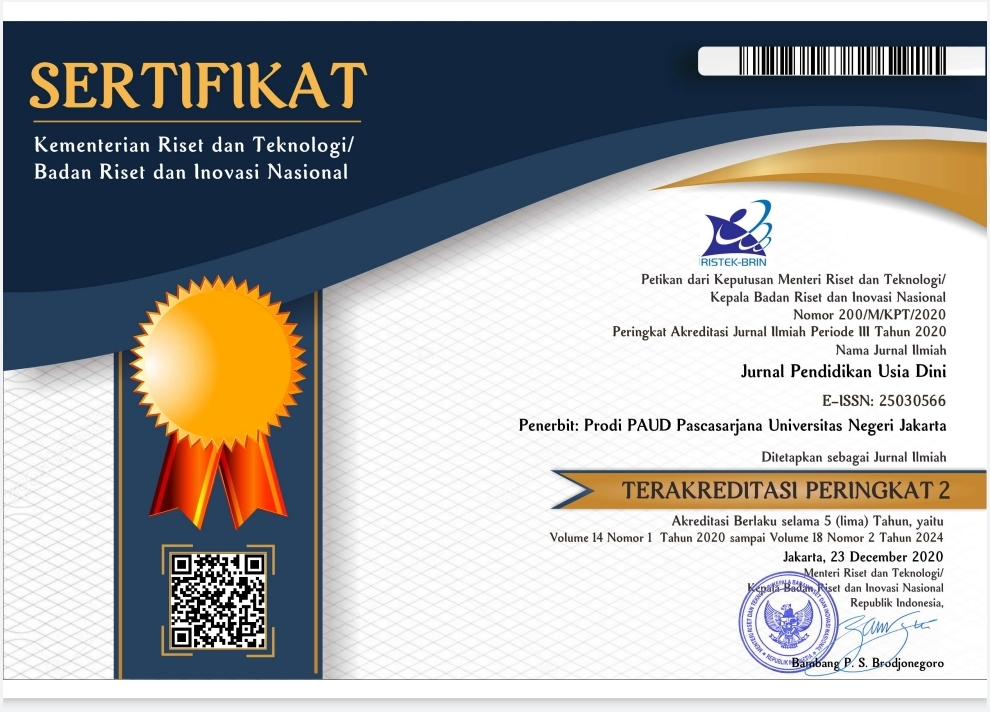Examining Teachers’ Roles in Early Childhood Sex Education: Insights from Indonesian Playgroups
DOI:
https://doi.org/10.21009/jpud.v18i2.49656Keywords:
Early childhood education, sex education, teacher’s role, playgroups, IndonesiaAbstract
This study investigates the roles of teachers in implementing sex education in Indonesian playgroups, focusing on their opinions, experiences, and methods. The research addresses the psychological effects of child sexual abuse and emphasizes the need for preventative measures through early education. Utilizing a qualitative approach, interviews were conducted with 13 teachers from various playgroups in Ciputat, Indonesia, and analyzed using Colaizzi’s method. The findings highlight two main themes: teachers' recognition of the importance of sex education and their practical experiences in implementing it. Most teachers agreed on the necessity of early sex education to promote awareness and protection against sexual violence. However, their understanding of the subject varied, with many expressing discomfort discussing sensitive topics. Teaching methods ranged from storytelling to demonstrations, but materials addressing reproductive organs were rarely included. The study underscores the importance of collaboration between teachers and parents to align educational goals. The findings contribute to the broader discourse on integrating comprehensive sex education into early childhood curricula, offering practical insights for policymakers and educators. Future research should explore the scalability of these approaches and their long-term impact on children’s safety and well-being.
References
Ashilah, A. dkk. (2023). Literature Review: Pentingnya Edukasi Seks Dalam Pencegahan Kekerasan Seksual Pada Anak. Kosala: Jurnal Ilmu Kesehatan, 11(2).
Bajaj, R., Rastogi, E., Gungwar, R. ., E.Rajesh, & Raja, G. P. (2023). Role of Parental Involvement in Education-A Study. September. https://www.researchgate.net/publication/374943692
Banerjee, D., & Rao, T. S. S. (2022). Comprehensive Sex Education—Why Should We Care? Journal of Psychosexual Health, 4(2), 73–75. https://doi.org/10.1177/26318318221092076
Cleland, J. A. (2017). The qualitative orientation in medical education research. Korean Journal of Medical Education, 29(2), 61–71. https://doi.org/10.3946/kjme.2017.53
Dunggio, T. (2023). Peran Komitmen dan Kompetensi dalam Meningkatkan Kinerja. Jurnal Bisnis Dan Manajemen West Science, 2(02), 102–110. https://doi.org/10.58812/jbmws.v2i02.320
Fadhilah, Q. S. (2021). Pengaruh seks edukasi terhadap kekerasan seksual pada anak usia sekolah: Literature review. Keperawatan, 11(2), 2–10. http://digilib.unisayogya.ac.id/5634/1/QORI SETYA F_1710201103_KEPERAWATAN - Qory Setya F.pdf
Fauziyyah, D. F., Sunendar, D., Sumiyadi, S., & Damaianti, V. S. (2023). Membaca Dunia Anak dengan Bijak: Peran Guru dalam Pembelajaran Cerita Anak Realis. Jurnal Obsesi : Jurnal Pendidikan Anak Usia Dini, 7(5), 5171–5180. https://doi.org/10.31004/obsesi.v7i5.5248
Gumiandari, S., & Nafi’a, I. (2019). GENDER BIAS CONSTRUCTED IN FREUD’S CONCEPT ON HUMAN PSYCHO-SEXUAL DEVELOPMENT (An Analyctical Study based on Islamic Psychological Analysis). PALASTREN Jurnal Studi Gender, 12(1), 211. https://doi.org/10.21043/palastren.v12i1.3315
Kemendikbud RI. (2015). Petunjuk teknis pelaksanaan kelompok bermain.
Manuputty, S. H. (2023). Analisis Undang-Undang Tindak Pidana Kekerasan Seksual Berdasarkan Teori Formil (Formielle Theorie). Souvereignty, 2(1), 82–88. https://journal.uns.ac.id/Souvereignty/article/view/130
Marfu’ah, S., Zaenuri, Masrukan, & Walid. (2022). Model Pembelajaran Matematika untuk Meningkatkan Kemampuan Penalaran Matematis Siswa. Prosiding Seminar Nasional Matematika, 5, 50–54. https://journal.unnes.ac.id/sju/index.php/prisma/
Nadeem, A., Cheema, M. K., & Zameer, S. (2021). Perceptions of Muslim parents and teachers towards sex education in Pakistan. Sex Education, 21(1), 106–118. https://doi.org/10.1080/14681811.2020.1753032
Nafilatul Ain, Anna Fadilatul Mahmudah, Susanto, A. M. P., & Imron Fauzi. (2022). Analisis Diagnostik Fenomena Kekerasan Seksual Di Sekolah. Jurnal Pendidikan Dasar Dan Keguruan, 7(2), 49–58. https://doi.org/10.47435/jpdk.v7i2.1318
Neto, L. S. da L., Albuquerque, L. C. C. de, Almeida, H. F. R. de, Filgueiras, A. C. G. F., Dantas, I., Leonardelli, M. P., & Dorneles, T. N. (2018). Expressions of Human Sexuality in the Phallic and Latency Phases: Reports from a Field Observation in Children of Porto Velho, Brazil. International Journal of Advanced Engineering Research and Science, 5(9), 27–35. https://doi.org/10.22161/ijaers.5.9.5
Nirmalawaty, C. M., Rivaldi, A., & Mujazi, M. (2021). Motivasi Menjadi Guru (Sebuah Refleksi). Prosiding Esa Unggul, 2–9.
Oktavianingsih, E., & Ayriza, Y. (2018). Teachers’ Knowledge and Belief for Educating Sexuality for Kindergarten Students. International Journal of Pedagogy and Teacher Education, 2(2), 307. https://doi.org/10.20961/ijpte.v2i2.19760
Oranga, J., & Matere, A. (2023). Qualitative Research: Essence, Types and Advantages. OALib, 10(12), 1–9. https://doi.org/10.4236/oalib.1111001
Pratiwi, H., Ismail, M., & Haida, R. N. (2023). Sexuality Education for Early Childhood: Themes, Methods, and Perceptions of Raudhatul Athfal (RA) Educators. Jurnal Pendidikan Dan Kebudayaan, 8(1), 35–55. https://doi.org/10.24832/jpnk.v8i1.3786
Rachmasari, Kurotul Aeni, Y. K. S. P. (2023). Level Agreement Persepsi Guru dan Orang Tua Terhadap Pendidikan Seks Anak Usia Dini. Jurnal Obsesi : Jurnal Pendidikan Anak Usia Dini, 7(1), 817–828. https://doi.org/10.31004/obsesi.v7i1.3730
Robinson, K. H., Smith, E., & Davies, C. (2017). Responsibilities, tensions and ways forward: parents’ perspectives on children’s sexuality education. Sex Education, 17(3), 333–347. https://doi.org/10.1080/14681811.2017.1301904
Setyowahyudi, R., & Leda, R. (2023). Ragam Strategi Pengenalan Pendidikan Seks Bagi Anak Usia Dini. Journal of Education for All, 1(2), 117–126. https://doi.org/10.61692/edufa.v1i2.34
Srivastava, K., Chaudhury, S., Bhat, P., & Patkar, P. (2017). Child sexual abuse: The suffering untold. Industrial Psychiatry Journal, 26(1), 1. https://doi.org/10.4103/ipj.ipj_83_17
Supriyati, S. (2018). The Role of Teachers in Teaching Sexual Education for Primary School Students. International Conference of Moslem Society, 2, 301–306. https://doi.org/10.24090/icms.2018.3284
Tirtawinata, C. M. (2016). Importance of Sex Education Since Early Age for Preventing Sexual Harassment. Humaniora, 7(2), 201. https://doi.org/10.21512/humaniora.v7i2.3523
Widayati, S., Saroinsong, W. P., Wagino, Syarifa, R. A., Yanna, A.-D. D., & Pratiwi, I. R. (2022). Sex Education Has a Positive Impact on Children’s Self Concept. Proceedings of the International Joint Conference on Arts and Humanities 2021 (IJCAH 2021), 618(Ijcah), 1183–1187. https://doi.org/10.2991/assehr.k.211223.207
Widiarsini, N. M. P., Ujianti, P. R., & Magta, M. (2021). Development of Picture Card Learning Media to Improve Sexual Understanding in Group B Kindergarten Children. Indonesian Journal Of Educational Research and Review, 4(1), 17. https://doi.org/10.23887/ijerr.v4i1.31565
Wirihana, L., Welch, A., Williamson, M., Christensen, M., Bakon, S., & Craft, J. (2018). Using Colaizzi’s method of data analysis to explore the experiences of nurse academics teaching on satellite campuses. Nurse Researcher, 25(4), 30–34. https://doi.org/10.7748/nr.2018.e1516
Wohab, M. A., & Akhter, S. (2010). The effects of childhood sexual abuse on children’s psychology and employment. Procedia - Social and Behavioral Sciences, 5, 144–149. https://doi.org/10.1016/j.sbspro.2010.07.063
Zain, N. M., Hazariah, S., & Hamid, A. (2020). The role of parents in providing sexuality education to their children. Makara Journal of Health Research, December. https://doi.org/10.7454/msk.v24i3.1235
https://kekerasan.kemenpppa.go.id/ringkasan) https://dataindonesia.id/varia/detail/sebanyak-21241-anak-indonesia-jadi-korban-kekerasan-pada-2022
Downloads
Published
How to Cite
Issue
Section
License
Copyright (c) 2024 https://creativecommons.org/licenses/by/4.0/

This work is licensed under a Creative Commons Attribution 4.0 International License.
JURNAL PENDIDIKAN USIA DINI work is licensed under a Creative Commons Attribution 4.0 International License. (http://creativecommons.org/licenses/by/4.0/)





